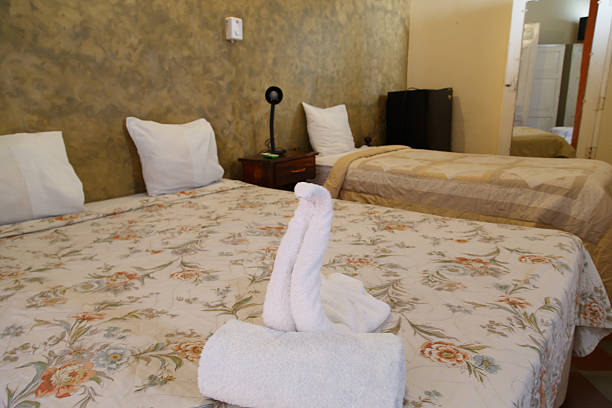Traveling often brings excitement, adventure, and a sense of freedom. However, not all travel experiences are filled with joy and relaxation. For some unfortunate travelers, the reality of staying in budget motels can quickly turn into a nightmare, thanks to a growing and unsettling problem: parasited motel malaise. This phrase encapsulates the distress and discomfort caused by infestations in motels, which can range from bedbugs to mites and beyond. In this blog, we’ll delve into the hidden infestations that lurk within some motels’ walls, their impact on guests, and how to protect yourself from these unwelcome encounters.
The Rise of Parasited Motel Malaise
In recent years, reports of infestations in motels have been on the rise. Bedbugs, in particular, have made a notorious comeback. These tiny, blood-sucking insects can infest even the cleanest of establishments, making them a formidable opponent for motel owners and a nightmare for guests. The resurgence of bedbugs is attributed to several factors, including increased travel and the bugs’ growing resistance to pesticides. However, bedbugs are not the only culprits. Dust mites, fleas, and even lice can find their way into motel rooms, contributing to parasited motel malaise.
The Unseen Threats
While bedbugs are often the most talked-about pests, other parasites can cause significant discomfort and health issues. Dust mites, for instance, are microscopic creatures that thrive in bedding, carpets, and upholstered furniture. Although they do not bite, they can trigger allergic reactions and asthma attacks, leading to sleepless nights and respiratory problems for sensitive individuals. Fleas, commonly associated with pets, can also infest motel rooms, especially if the previous guests traveled with animals. Flea bites can cause itching, redness, and even infections if scratched excessively. Lice, though less common in motels, can spread through shared bedding or towels, leading to itching and irritation.
The Impact on Guests
The presence of parasites in a motel room can have a profound impact on guests. Physically, bites from bedbugs, fleas, or lice can cause itching, redness, and swelling. In severe cases, individuals may develop allergic reactions or secondary infections from scratching. Beyond the physical discomfort, the psychological toll of discovering an infestation can be significant. Anxiety, stress, and sleeplessness are common among guests who find themselves in a parasited motel. The knowledge that they are sharing their sleeping space with blood-sucking insects or other parasites can lead to a deep sense of unease and distress.
Identifying the Signs
Recognizing the signs of an infestation is crucial for travelers. Bedbugs are notoriously elusive and can hide in tiny crevices, making them difficult to spot. However, there are telltale signs to look out for. Small, rust-colored stains on sheets or mattresses may indicate bedbug excrement. Tiny, reddish-brown bugs or their shed skins can sometimes be found in mattress seams, headboards, or furniture. For dust mites, look for signs of allergic reactions, such as sneezing, coughing, or itchy eyes, particularly when spending time in bed. Fleas may leave behind small, dark specks of dirt (flea excrement) on bedding or carpets. If you suspect lice, check for tiny, white eggs (nits) attached to hair strands or itching on the scalp.
Preventing Parasites Motel Malaise
Preventing an encounter with parasites in motels starts with careful planning and vigilance. Here are some steps to take before and during your stay:
- Research and Reviews: Before booking a motel, read reviews from previous guests. Pay close attention to any mentions of infestations or cleanliness issues.
- Inspection Upon Arrival: When you first enter your motel room, conduct a thorough inspection. Check the mattress seams, headboard, and furniture for signs of bedbugs. Look for dust mite-related symptoms and flea dirt on carpets and bedding.
- Elevate Your Luggage: Keep your luggage off the floor and bed. Use luggage racks or place your suitcase on a hard surface, such as a table or dresser, to reduce the risk of bedbugs hitching a ride.
- Seal Your Belongings: Store clothing and other items in sealed plastic bags within your suitcase. This can help prevent bedbugs or other parasites from infesting your belongings.
- Protective Covers: Consider using bedbug-proof encasements for pillows and mattresses. These covers can help prevent bedbugs from establishing a home in the bedding.
- Regular Cleaning: During your stay, keep the room clean and clutter-free. Vacuum the floor, especially around the bed and furniture, to remove any potential pests.
Dealing with an Infestation
If you discover an infestation during your stay, it’s important to take immediate action:
- Notify the Management: Report the issue to motel management as soon as possible. Request a different room or, if the problem is severe, consider finding alternative accommodation.
- Inspect and Clean Your Belongings: Carefully inspect your luggage and clothing for any signs of parasites. If you suspect an infestation, wash your clothes in hot water and dry them on high heat.
- Seek Medical Attention: If you experience severe reactions to bites or allergic symptoms, seek medical attention. A healthcare professional can provide treatment and advice on how to alleviate symptoms.
The Responsibility of Motel Owners
While travelers can take steps to protect themselves, motel owners also have a significant responsibility in preventing and addressing infestations. Regular inspections, thorough cleaning routines, and prompt response to guest complaints are essential in maintaining a parasite-free environment. Investing in professional pest control services and using protective encasements for mattresses and pillows can also help mitigate the risk of infestations.
Conclusion
Parasited motel malaise is an unfortunate reality that can turn a budget-friendly stay into a distressing ordeal. By understanding the signs of infestations, taking preventive measures, and knowing how to respond if an issue arises, travelers can reduce the risk of encountering these unwelcome pests. Motel owners, too, play a crucial role in maintaining a clean and parasite-free environment for their guests. Together, through vigilance and proactive measures, we can unveil and address the hidden infestations that contribute to parasited motel malaise, ensuring safer and more comfortable stays for all travelers.
Read Also: What is StufferDNB? A Comprehensive Overview


